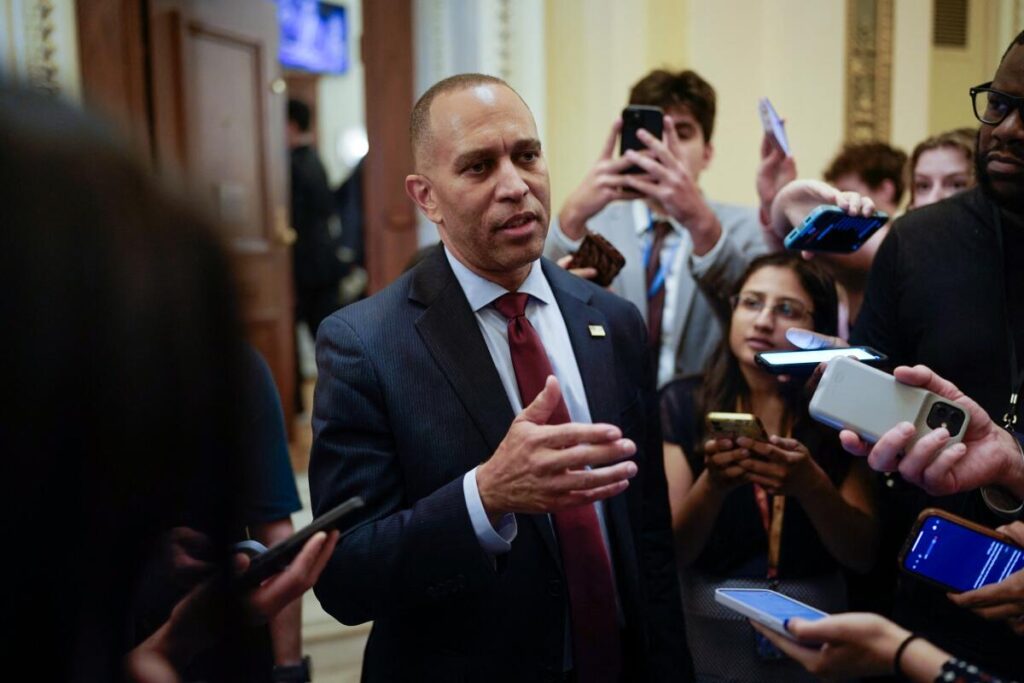
WASHINGTON — In a striking display of political theater, Democratic leader Hakeem Jeffries of New York held the House floor for over eight hours on Thursday, effectively delaying the passage of a Republican tax and spending cuts bill. Jeffries utilized what is colloquially known as the “magic minute” — a privilege allowing party leaders to speak indefinitely during debates — to critique the legislation he deemed “immoral.”
Beginning his speech at 4:53 a.m. EDT and concluding at 1:37 p.m. EDT, Jeffries broke the previous record held by then-Rep. Kevin McCarthy, who spoke for 8 hours and 32 minutes in 2021. Jeffries’ marathon session pushed the final vote on the contentious bill, initially scheduled for the early morning, into the afternoon.
Critique of GOP Legislation
The New York Democrat seized the opportunity to lambast the proposed cuts to healthcare and food aid, tax breaks for the wealthy, and rollbacks on renewable energy programs. “This reckless Republican budget is an immoral document,” Jeffries declared, emphasizing the bill’s potential adverse effects on vulnerable populations.
Throughout his speech, Jeffries interwove personal anecdotes and cultural references, touching on topics as diverse as hip-hop and King George III, to maintain engagement and underscore his points. He also highlighted stories from constituents concerned about their healthcare, drawing attention to the human impact of the proposed legislation.
Historical Context and Political Strategy
Jeffries’ speech is reminiscent of past marathon speeches used as a strategic delay tactic. In 2018, Rep. Nancy Pelosi spoke for over eight hours on immigration, while in 2021, McCarthy criticized the Democrats’ “Build Back Better” plan in a similar fashion. These extended speeches serve not only to delay proceedings but also to capture public attention and rally party members.
Democrats, unable to stop the bill’s passage due to a budget procedure bypassing the Senate filibuster, resorted to delay tactics. In the Senate, Democratic leader Chuck Schumer forced clerks to read the bill for nearly 16 hours over the weekend. Such maneuvers highlight the limited tools available to minority parties in legislative battles.
Reactions and Implications
The reaction from Republicans was dismissive. House Ways and Means Committee Chair Jason Smith labeled Jeffries’ speech “a bunch of hogwash,” asserting that it would not alter the bill’s outcome. House Majority Leader Steve Scalise accused Democrats of obstructing progress, stating they “wanted to stand in the way of history.”
Despite the bill’s eventual passage, Jeffries’ speech succeeded in galvanizing his party and drawing public scrutiny to the legislation. The event underscores the ongoing partisan tensions in Congress and the lengths to which minority parties will go to voice opposition.
Looking Ahead
As the political landscape continues to evolve, such displays of endurance and rhetoric are likely to remain a fixture in legislative strategy. The use of prolonged speeches as a form of protest and persuasion reflects the deep divisions within Congress and the high stakes of contemporary policy debates.
Jeffries’ marathon session, while unable to prevent the bill’s passage, exemplifies the power of oratory in shaping public discourse and rallying political support. As legislative battles continue, the ability to command attention and articulate a vision remains a crucial skill for political leaders.
“We don’t work for President Donald Trump,” Jeffries asserted, invoking civil rights icon John Lewis: “Get into good trouble, necessary trouble. We’re going to press on until victory is won.”
As the dust settles on this latest legislative skirmish, both parties will undoubtedly regroup and strategize for future confrontations, with each side seeking to leverage public opinion and political capital in their favor.






